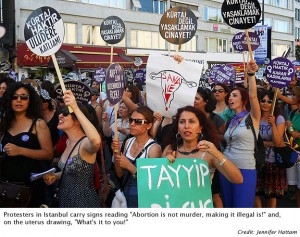Personhood: How Alternative Interpretations Can Broaden Debates
In the third week of August, I attended the 6th Sexuality Institute conducted by the Coalition of Sexual and Bodily Rights In Muslim Societies (CSBR), which presented plenty of opportunities to discuss the various interpretations of the Quran and the contexts within which abortion is positioned in these discourses. I am not Muslim, but work with ASAP’s partners in several Islamic States, and so these debates were informative and also extremely helpful in understanding issue I encounter at work.
 Broadly, the discussions at the institute focused on sociopolitical developments in Islamic societies after 9-11: the rise of anti-Islamic sentiments in the West and the subsequent rise of fundamentalist and Muslim nationalist views in Islamic countries, both of which reinforce patriarchal values, curbing sexual and reproductive freedom.
Broadly, the discussions at the institute focused on sociopolitical developments in Islamic societies after 9-11: the rise of anti-Islamic sentiments in the West and the subsequent rise of fundamentalist and Muslim nationalist views in Islamic countries, both of which reinforce patriarchal values, curbing sexual and reproductive freedom.
An expert invited to talk about Islam’s view on abortion, gender and sexuality was Siti Musdah Mulia, a senior researcher, activist, and lecturer, who is the first woman to have obtained a Ph.D in the field of Islamic Political Thought from the State Islamic University of Syarif Hidayatullah, Jakarta (1997). In her lectures Musdah gave a brief introduction to verses or passages in the Quran that mention these issues, outlined various interpretations of these issues and then discussed their impact on laws in Islamic States.
I was a little surprised to learn that abortion is not mentioned in the Quran, and that the control of women’s access to safe abortion springs entirely from passages that support patriarchal notions of motherhood and femininity. In addition to these, fundamentalists have favoured the use of these passages over those in support of women’s right to dignity and a life without violence, particularly in her home. Since there is no direct mention of abortion in the Quran, and any restriction on abortion is entirely dependent on interpretation, Musdah advised activists to work with religious leaders who interpret the verses liberally.
Interestingly, the other argument against abortion springs from ensoulement, or the insertion of a soul in the fetus transforming it into a person. Since ensoulement occurs after a few weeks of pregnancy, Islam is not against abortions conducted in early pregnancy, perhaps explaining why laws in several Islamic countries allow early abortions. This is vastly different from the demands on restrictions to abortion made by the Christian right in Western nations, on the grounds that life begins at conception.
However, the Islamic world does not have one view of when ensoulement takes place. In some communities it is assumed to take place as early as the 9th or 10th week of pregnancy, while others believe it takes place around the 16th week of pregnancy, making the demand for abortions a little complicated. Restrictions based on gestational age can be incredibly harsh and restrictive for women, particularly because several women discover their pregnancy only around or after 10 weeks. But since ensoulement was not interpreted uniformly across the Islamic world, Musdah said that it was possible to campaign for the most liberal interpretation to be considered in the formulation of laws.
It was in fact very encouraging to hear Musdah lay emphasis on interpretation, which could be the key to liberal laws within the Islamic world, and also in countries where conservative interpretations of Buddhism, Hinduism or Christianity pose problems. These alternative interpretations allow women to recognize oppression and demand their rights under the aegis of their religion, giving fundamentalist elements very little reason to squash their argument under pretexts of preserving the religion.






